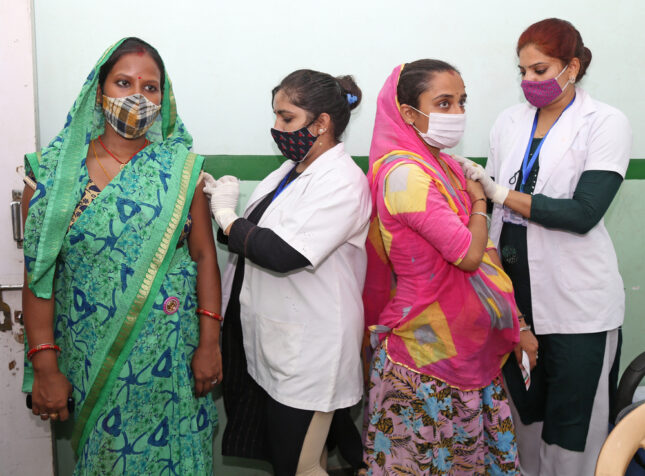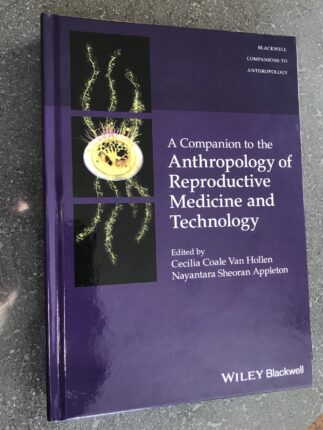-
An Essential Handbook for Reproductive Global Health

As the world becomes increasingly interconnected through travel, communication, and information, interdisciplinary approaches to address global and reproductive health issues are crucial. And as the politics of reproductive healthcare are shifting in uneven ways across the globe, the need for deep understanding of local contexts within a globalized world is ever more vital. Our recently published, co-edited Wiley Blackwell handbook, A Companion to the Anthropology of Reproductive Medicine and Technology provides a sweeping overview of studies of reproduction from an anthropologically informed lens with a commitment to interdisciplinary approaches at the intersection of medical anthropology, feminist Science and Technology Studies (STS), global and public health, and critical analyses of both gender and sexuality and of race and ethnicity.
The authors of the twenty-eight chapters in this book investigate a wide range of topics globally, from cutting edge research on reproductive health financing; disability and reproduction; COVID-19 and reproduction; race and reproductive justice; reproduction for LGBTQIA+ communities; reproduction and war; reproduction and migration; emerging reproductive technologies; reproductive cancers, and environmental concerns shaping reproductive lives, to critical updates on more traditional work on obstetrics and midwifery; maternal health and the Global Safe Motherhood Initiative; maternal mortality; abortion; contraception; in vitro fertilization, surrogacy, and sperm banking; menstruation, and other issues.
The handbook is organized into five thematic sections: (1) Reproductive Practitioners and Paradigms, (2) Global Reproductive Health Interventions, (3) Reproductive Justice, (4) Reproductive Life Course, and (5) (Re)Producing the Future: Sociality of Reproductive Medicine and Technology. As co-editors, our own research expertise animates this book. Our research and experiences teaching diverse students in the United States, Singapore, and Aotearoa New Zealand motivated us to create this handbook. We prioritized creating a handbook with deep scholarship that is also accessible. This decision speaks to our politics of ensuring that this collective research does not stay in academic texts, but rather informs policy and practice to improve people’s reproductive lives.

The Lived Experiences of Reproduction in a Global Context
Social, cultural, political, and economic context shapes the production of knowledge and the technological management of human reproduction across the globe. Each chapter in this book makes the case that ethnography—anthropology’s hallmark method of research and writing—is essential for providing a person-centered and context-specific understanding of the lived experience of reproduction from the perspective of patients, medical practitioners, policymakers, and scientists. Grounded ethnographic research provides crucial insights that complicate assumptions based on demographic statistics and laws alone. For example, drawing on ethnographic research from multiple sites around the world, Maya Unnithan, Silvia De Zordo, Astrid Blystad, and Karen Marie Moland, the authors of Chapter 20 on the anthropology of abortion, conclude that “categorizations of abortion laws along a liberal–restrictive axis commonly tell us little about the reality of access to safe abortion services in concrete contexts” (Pg. 353).
In our co-authored introduction, we trace the arc of the field of the anthropology of reproduction from the 1970’s focus on cross-cultural variations in meanings and practices of reproduction and patriarchal restrictions on reproductive rights; to the 1990’s studies of stratified reproduction, and the impact of globalization and varied forms of reproductive governance (by state, international, multilateral, and religious institutions) on the lives of people around the world; to more recent goals of documenting forms of reproductive injustice (related to patriarchies, racism, casteism, homophobia, colonial legacies, and extractive global capitalism) and activist movements for reproductive justice in the 21st century. Throughout this history and across all of the chapters in this handbook, anthropologists studying reproduction reveal how culture and politics interact to shape the experiences of reproduction and reproductive health around the world.
As will be clear even on a cursory skim, most chapters in this handbook provide critical analyses as well as potential solutions for improvement and directions for future research.
For example, in Chapter 7 on maternal mortality in a global context, Vanessa M. Hildebrand, who has conducted research in Indonesia and the United States, argues:
[…] that in an effort to amplify the grave maternal health problems in poor countries, the anthropology of maternal death has become overly linked to the location in which these deaths happen, to the detriment of tracking pathways of inequality. Maternal death happens everywhere, nearly always when oppression and discrimination are at play… To make best use of anthropologists’ ability to powerfully place these deaths in context, inequality must be at the forefront, not the location of those deaths (Pg. 140).
Similarly, when Peruvian medical anthropologist Lucía Guerra-Reyes writes in Chapter 4 of Indigeneity and Interculturalidad-inspired approaches to birth care in Latin America, she identifies problems, but also possibilities:
Major structural changes are needed to ensure both the right to health and the right to culturally respectful care. Changes should include equal participation of Indigenous representatives in developing, implementing and defining meaningful oversight measures for policies and programs…Interculturalidad continues to cement its symbolic and political value in the region; engaging critically with its applications will move the region closer to desired equitable justice-oriented forms of Indigenous healthcare (Pg. 80).
Likewise, Appleton’s Chapter 19 on global studies of hormonal contraception reveals these twin impulses when she writes:
Contemporary diverse feminists’ engagements are committed to asking for access to better hormonal contraceptives but also recognize the importance of supporting people’s desire to reject those same hormonal contraceptives. They are cognizant of the environments we live in while also attempting to make them better (Pg. 342).
Additionally, the Afterword by Aditya Bharadwaj entitled “Reproducing on an Impaired Planet,” presents a powerful critique of the countless ways that human reproduction has been imperiled by short-sighted human competition for power and wealth, but it is also an optimistic call for action, inspiring us to double down on our commitments to apply ethnographic research and critical analysis towards the goal of reproductive justice for all.
Dr. Cecilia Coale Van Hollen is a professor in the Edmund A. Walsh School of Foreign Service at Georgetown University. She is a medical anthropologist with over thirty years of experience conducting ethnographic research on reproductive healthcare in India and is the author of three books: Birth on the Threshold: Childbirth and Modernity in South India (2003); Birth in the Age of AIDS: Women, Reproduction and HIV/AIDS in India (2013); and Cancer and the Kali Yuga: Gender, Inequality and Health in South India (2022). She was a 2018 Public Policy Fellow with the Maternal Health Initiative at the Wilson Center.
Dr. Nayantara Sheoran Appleton is a Senior Lecturer at the interdisciplinary School for Science in Society, Te Herenga Waka | Victoria University of Wellington, Aotearoa New Zealand. Trained as a feminist medical anthropologist and STS Scholar (PhD, cultural studies) she has co-edited Methods, Moments, and Ethnographic Spaces in Asia (2021) and the above featured A Companion to the Anthropology of Reproductive Technology and Medicine (2023). She is also working on a monograph titled Demographic Desires, Mediated Medicine, and Emergency Contraceptive Pills in Contemporary India. She is the recipient of the New Zealand Royal Society’s Marden Fast Start (2023) on the Social Lives of Sex Hormones.
Sources: Geneva Graduate Institute, Indiana University Bloomington, Ohio Wesleyan University, University of Barcelona, University of Bergen, University of Sussex, Victoria University of Wellington, Wiley.
Photo Credit: Indian health workers administer first dose of COVID-19 vaccine to two pregnant women. Sumit Saraswat/Shutterstock.com
 A Publication of the Stimson Center.
A Publication of the Stimson Center.




